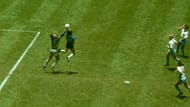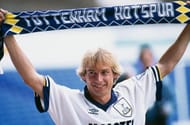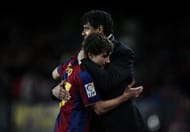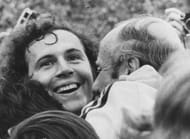Diego Maradona was an exceptional player but couldn't gain as much success as a manager
It's an old argument that the media folk frequently trumpet, that to be a great manager, one has to have previously been a great footballer, and have experience on the pitch. The argument immediately withers when people like Jose Mourinho and Arrigo Sacchi are considered: neither played professionally to any good level and both have changed football, in their own way, after becoming coaches.
It's not necessary to have played the game to a high standard to become a manager, but it also doesn't exclude world-class players from making it in coaching; there are examples to all sides.
Indeed, it can be hard for a truly elite player to top the achievements of his playing career off the pitch, even if they enjoy success as a manager. This slideshow, therefore, looks at the top 5 examples of managers who - whether because they were supreme in their playing days or also notably poor in management - were much better as football players:
#5 Diego Maradona

The life and career of the best Argentinian footballer before Lionel Messi's arrival is well-documented and he's certainly among the top 5 players of all time. Maradona was an era-defining talent, the best to follow Pele (and his eternal rival), and his charisma and swagger made him a sporting icon.
Maradona's highlight reels are immense: everyone remembers his 'Goal of the Century' against England in the 1986 World Cup, as he slalomed his way past five English defenders before slotting past Peter Shilton; he completely inspired Napoli to their first ever Serie A title in 1987.
Some players seem destined for a transfer into management but Maradona, with his volatile temperament and off-field problems, wasn't one of them. It was highly surprising, then, when it was announced that Maradona would take over as the Argentina national team in 2008.
He had precious little experience in management up until then, with just two short spells in his homeland with Mandiyu de Corrientes and Racing Club 13 years previously, and the results were uninspiring.
He was in charge of a 6-1 loss to Bolivia, equaling the team's worst ever margin of defeat. He unleashed an abusive tirade at the media after the country's qualification for the 2010 World Cup, resulting in a 2-month ban.
After a promising start in that tournament, Germany routed them 4-0 in the quarter-finals, bringing an end to his time in charge of his beloved nation. Maradona was the main reason Argentina triumphed in the 1986 World Cup and he took them to another final in 1990, but it was always too romantic a notion to conceive of him guiding them to similar success as a manager.
He's only forayed into management again two times, both in the UAE with Al Wasl and Fujairah (his current side) but it's very unlikely that management will ever suit the great Maradona.
#4 Jurgen Klinsmann

Another excellent player who tried to replicate international success in management, Klinsmann has now undertaken three high-profile jobs, all with limited results. He was one of the most prolific strikers of his generation, scoring freely in Italy, France, England, and especially Germany.
It was on the international stage where Klinsmann really shone - similar to his compatriot Miroslav Klose - and he was an important part of the sides that won the 1990 World Cup and 1996 European Championships.
He would retire with a fine 47 goals for West Germany/Germany, putting him joint-fourth in the all-time list; he also ranks sixth in the World Cup all-time scoring charts, with an excellent 11 goals.
He was made head coach of Germany in 2004 after the country's disastrous performances at Euro 2004, and he sought immediately to rectify this by introducing youthful energy and new ideas into the squad. Leading up to the 2006 World Cup, Klinsmann drew strong criticism for his offensive style and outspoken manner but the team's subsequent performances silenced the doubters.
Germany comprehensively won their group, saw off Sweden and Argentina in the knockout rounds, before succumbing to Italy in dramatic fashion, losing two goals in the final minutes of extra-time.
Former critics became fans and, despite insistence for him to continue, Klinsmann departed, and his former assistant Joachim Low was appointed (and who has led Germany to new, spectacular heights).
Club football with Bayern Munich followed in 2008 but he was sacked in April 2009, after a stuttering campaign. They had reached the quarter-finals of the Champions League, were third in the Bundesliga with five games left to play, but for a club of Bayern's stature, Klinsmann's performance just wasn't good enough.
Club Captain Philipp Lahm would later say in his autobiography that Klinsmann was a failure in charge, and lacked tactical knowledge and strategy, a damning indictment.
In a return to international football, Klinsmann's most recent job was with the U.S.A, from 2011 to 2016. Initial historic wins over Italy and Mexico showed promise, and the last-16 was reached in the 2014 World Cup, but his firing came after the USMNT's worst showing in the 2015 CONCACAF Gold Cup since 2000 after finishing fourth, and Klinsmann left them rooted to the bottom of their World Cup qualification table.
The German doesn't seem like a wholly terrible coach and has shown promise in each of his roles, but he'll never be as consistently excellent as he was during his playing days.
#3 Frank Rijkaard

Over a decade ago, it seems possible that Rijkaard was on his way to top his great playing career: in charge of Barcelona, he won them their second Champions League title in 2006, as well as two La Liga titles in 2005 and 2006.
With a potent attack featuring Ronaldinho and Samuel Eto'o, Barcelona were playing some of the best football in Europe. Two trophy-less campaigns followed, and Rijkaard stepped down in 2008. The quality of players remained the same but the Dutchman seemed tired, disillusioned, and he's unfortunately never recovered since.
A year in Turkish football with Galatasaray yielded no success and his last outing was in charge of Saudi Arabia, which ended with a win percentage of just 25.93%. It was a sad decline for a man who was amongst the finest coaching talent from 2003 to 2008, but Rijkaard always has his distinguished playing days to look back on, for he was one of Europe's best midfielders in the 1990's.
Alongside Marco van Basten and Ruud Gullit, he was the Dutch influence that made AC Milan one of the revered sides of their era, as they helped the club consecutive European Cups in 1989 and 1990 (the last club to achieve the feat until Real Madrid last season), and the trio was always instrumental in the Netherlands winning their first international trophy, the 1988 European Championships.
He was ferocious, commanding, yet stylish on the ball, and remains one of the best defensive midfielders to play the game - none of which describe his role as a manager.
#2 Kenny Dalglish

For a while in the 1990s, it seemed like 'King Kenny' would continue his amazing playing career into management for a long time. After taking over as player-manager in 1975, Dalglish won Liverpool three league titles in four years, adding two FA Cups in 1986 and 1989 for good measure.
It's a sad fact that English teams were banned from European competition during this period, for that Liverpool side, with John Barnes and Peter Beardsley, could have seriously challenged under Dalglish's tutelage.
Astoundingly, at the time of his resignation in 1991, Liverpool were three points ahead in the league and there's every reason to expect that they would have emerged still on top.
In October of that year, he sought a new challenge with Blackburn Rovers in the Second Division; within four years, Dalglish took them to an incredible EPL title in 1994/1995, only topped by Leicester in terms of shock value.
Again, he quit while he was ahead, and he would go on to win only a Scottish League Cup with Celtic in 2000 and a Football League Cup back with Liverpool in 2012.
His trophies in coaching would make most people proud but it says so much about Dalglish's standing in football that he's mostly remembered for his playing career. Perhaps Scotland's greatest ever player, perhaps Liverpool's greatest ever player too, Dalglish was a world-class talent: he didn't score the most goals but he influenced play immeasurably and transformed teams when he played for them.
He succeeded the famous Lisbon Lion generation and fired Celtic to four league titles and four Scottish Cups in 5 years from 1972 to 1977; after his move to England, Dalglish led the team from the front as Liverpool dominated the European Cup, winning in 1978, 1981, and 1984.
#1 Franz Beckenbauer

Unlike Maradona, Beckenbauer was able to translate his world-class footballing talent into management and is fondly remembered for his time as both. He remains one of only two men to win the World Cup as both a player and manager (alongside Brazil's Mario Zagallo), after triumphing as team captain in 1974 and head coach in 1990.
He had taken West Germany to the 1986 final, too, but Maradona and his teammates ensured he ended up as losing manager. Revenge would come in that final in 1990, however, as they beat Argentina 1-0.
Beckenbauer moved into club management, with Marseille, but would leave after only 25 games, although the team would go on to win the Ligue 1 title.
Further brief spells with Bayern Munich in 1994 and 1996 reaped a Bundesliga and UEFA Cup win respectively. Beckenbauer never took another management role after this year, and 51 was a relatively young age for a manager to retire; the sense is that he had the ability to find great success in coaching if he had continued.
What's not debatable is Beckenbauer's standing in football overall, for he is definitively one of the greatest ever to play the game, perhaps even the best defender of all time. Indeed, he even pioneered the modern sweeper role of the central defender, or 'libero', such was his style and dominance during his era.
He won four Bundesliga titles and three European Cups with Bayern, transforming them from a relatively small team into European powerhouses.
After helping make 'soccer' popular in the United States with Pele, Beckenbauer returned to Germany and played his part in Hamburg winning the league, all at the age of 36. Alongside that World Cup win in 1974, he was instrumental in West Germany triumphing in the European Championships two years before.
One of the few defenders to win the Ballon d'Or (in 1972 and 1976), Beckenbauer can boast one of the best careers football has ever witnessed. An innovator, an icon, a national hero, the German legend will always be remembered for his incredible playing achievements over his managerial ones.
